Careers
Careers Support
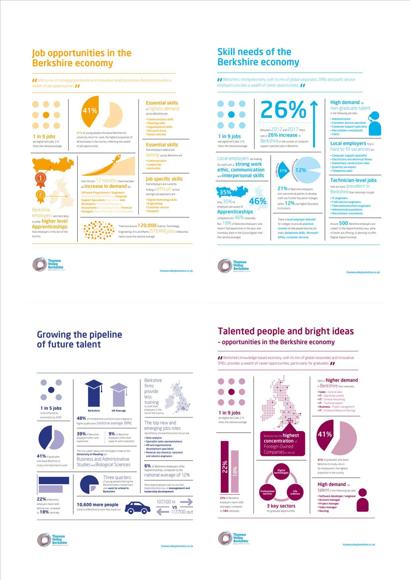 Through Year 7 - 11 careers support is available through the school Careers Lead, Mr Jackman. E: sjackman@forest.academy. T: 0118 978 1626.
Through Year 7 - 11 careers support is available through the school Careers Lead, Mr Jackman. E: sjackman@forest.academy. T: 0118 978 1626.
Follow @CareersForest
Within school many career events take place, including career specific speakers, workshops, information about college, apprenticeships and sixth form, CV writing, interview techniques etc.
As part of the PSHE curriculum we provide career-related lessons, activities where local businesses help to provide a realistic experience such as Mock Interviews, college and apprenticeship events, and trips related to various career topics.
Full details of The Forest School's approach to careers can be found in our Policy here
We also recommend the National Careers Service website. A number of independent careers sites help parents and students. Including Start Profile.
Happy National Apprenticeships Week! 7th - 11th February 2022 Click the 'all about apprenticeships and traineeships tab' below for more details
What will you do when you leave school?
All young people must stay in some form of 'learning' until either their 18th birthday or when they achieve a level 3 qualification such as 2 A levels or similar. This is known as ‘Raising the Participation Age’ or RPA.
What this means for you ....you must choose one of the following:
-
An Apprenticeship
-
Full-time education in school or college
-
Employment, self-employment, volunteering (including caring), or an internship for at least 20 hours a week, for more than 8 weeks, and attend part-time learning for the equivalent of 1 day per week.
Why is this better for you?
You will have better job prospects and increased earnings over your lifetime. For example, getting a level 2 Apprenticeship by £73,000, and a level 3 Apprenticeship increases earnings by an estimated £105,000. The opportunities for unskilled work are shrinking drastically, so choosing an option will help you compete and hold down work in the future.
Recent research shows that getting at least 5 9-1 grades at GCSE opens the door to higher earnings. Read more here.
Earning & Learning
If you are not on an Apprenticeship, but are employed, you will need to either:
-
Train towards an accredited qualification as part of that job, or
-
Enrol on an accredited part-time course for the equivalent of 1 day per week in addition to your job.
Where can I find out more about the local labour market?
For more information speak with Mr Jackman, Careers Lead. To understand the local labour market view the latest Berkshire Labour Market Update
To understand specific job sectors within the Thames Valley, Berkshire area click here
Deciding on your career
Events & Advice - useful careers web sites and advice services, the latest on careers events, college open days in the area, company events, preparing a CV, wowing at interviews etc.
Jobs & Training - current job vacancies (including part time), those advertised in local newspapers, and links to companies recruiting. Help with applications & CVs. Advice for school leavers. See also Apprenticeships.
Apprenticeships - links to the current vacancies and how to apply.
Volunteering - expand your CV and your skills and improve your chances of getting the job or uni place you want . Links to local volunteer centres and volunteer schemes.
Still not sure which career?
There are plenty of organisations and web sites to help you with ideas, and decide the next step on your career path.
- First, find out what your key skills and interest are by using custom software like Start Profile - you will receive your school code from Mr JAckman, and you can use this at home as well as in school. Parents and Guardians can also logon to the Start Profile site to access a range of useful careers information.
- The National Careers Service has some good career tools which will help you identify your skills and also has a wide range of job profiles.
- Visit various career information at the web sites below:
- https://targetcareers.co.uk/careers-advice
- www.careers4u.tv/
- www.icould.com/
- www.healthcareers.nhs.uk
- www.discovercreativecareers.co.uk
- www.notgoingtouni.co.uk
- www.sacu-student.com/?page_id=2779
- Search here for different types of apprenticeships - everything from agriculture to child care, legal to IT, as well as engineering
- www.gov.uk/higher-education-courses-find-and-apply
- www.whatuni.com
- www.studential.com
- Try work experience or a part time job. A work placement during the school holidays, can help you try out options whilst gaining valuable contacts. Part time work in any area will help with accessing your chosen career area e.g. serving food can help develop your customer skills, whilst newspaper delivery jobs show job commitment.
The hours you can work vary according to your age.
Have more than one option - your 'Plan B' - in case something unforeseen happens like you don't achieve the grades you need.
Know when you can leave school. Click on the link below to see government guidelines.
https://www.gov.uk/know-when-you-can-leave-school
National Careers Service helpline for Teenagers
National Careers Service
Telephone: 0800 100 900
Text messages: 07766 413 219
Monday to Sunday, 8am to 10pm
Find out about call charges
You can also arrange for a National Careers Service adviser to call you - this won’t cost you anything.
Jobs and Training
Follow The Forest Careers Twitter Feed via https://twitter.com/CareersForest?s=20
| Links to Vacancies | |
| Part time/ summer jobs for students | Universal Jobmatch |
| Get my first job | www.getmyfirstjob.co.uk |
| CV Writing and Examples of CVS | Example CVs (courtesy of University of Kent) |
| If you haven't organised any training, employment or further education, there are a range of courses that can help you make a choice. Visit the Elevate Me website for help with applying for jobs, vacancies and courses. It specialises in helping 16-24 year olds. | http://berkshire.elevateme.org.uk/ |
| There are plenty of opportunities if you don't want to go to university, or don't want to go straight away. A useful web site to start with is | www.notgoingtouni.co.uk |
News and Events
| Looking for University insights, masterclasses and workshops, visit: |
www.studyhigher.co.uk also has a chat facility for students and parents. www.smallpeice.trust.co.uk hold bespoke stem courses. |
| Looking for virtual work experience, check out the following organisations: |
https://www.springpod.co.uk/virtual-work-experience-programmes, |
| For employer insights look at: |
Pathway CTM offer employer insight activities www.pathwayctm.com Learn Live https://learnliveuk.com/ Speakers for Schools for their inspirational talks https://www.speakersforschools.org/inspiration/vtalks/upcoming-vtalks/ National Careers Week information - https://ncw2021.co.uk/ GoCompare - What are the riskiest jobs ? - https://www.gocompare.com/life-insurance/uk-riskiest-jobs-report/ |
All about Apprenticeships and Traineeship
|
|
|
|
Why should I do an apprenticeship? It's a real job with training, so you can earn while you learn and pick up recognised qualifications as you go. Training may take place on the job, at college or, for higher level apprenticeships, actually at a university or combination. Your employer will pay for your training and, in some cases, university fees.
There are over 180 different types of apprenticeships in a wide range of subjects - from arts, farming, child care, IT and accountancy to more traditional subjects like engineering and motor mechanics. Click here to see the full range. If you live in England, are >16 and not in full time education you can apply. Apprenticeships take 1-4 years.
Find out more about Apprenticeships
|
Examples of where your subject can take you
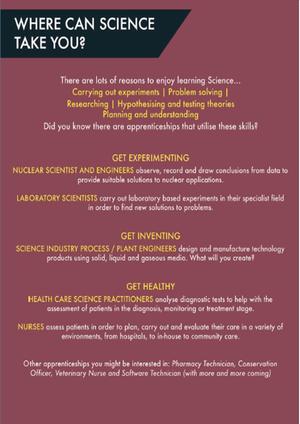
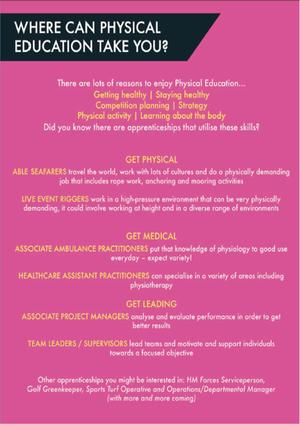
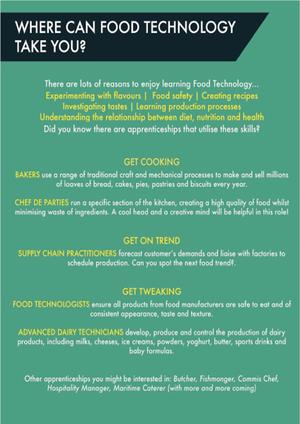
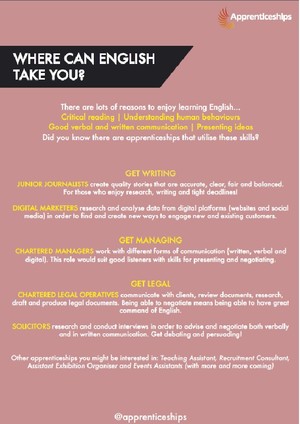
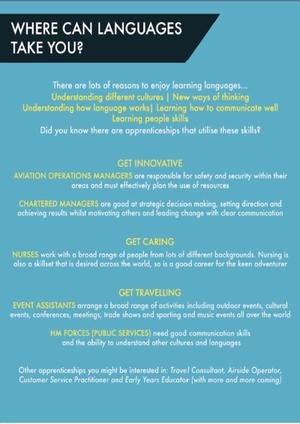
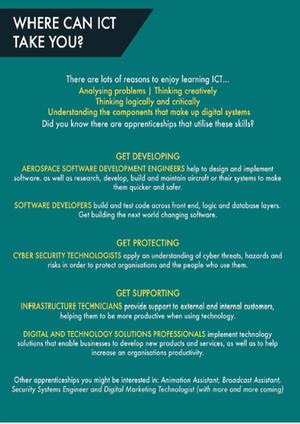
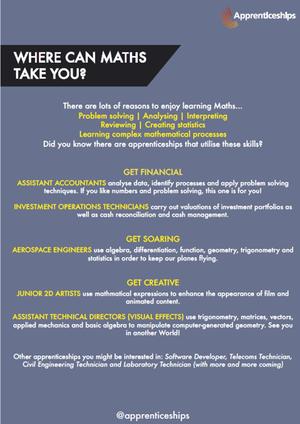
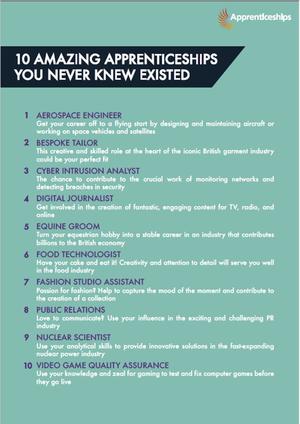
| Subject | Develops skills in.... | Possible career paths |
|---|---|---|
| ART |
Thinking creatively |
Animator |
| Business Studies |
Researching and presenting information |
Business advisor |
| Computing and ICT |
Research |
Software developer |
| Design Technology | Problem solving Organisation Communication Creativity Interpreting data and information IT skills Technical skills Patience Designing and making ICT Analysis Discipline |
Fashion styling Art and design Media Photography Construction and building services Graphic design Architecture Engineering Product design Food technologist Manufacturing Production Textile designer Self-employment |
| Drama | Presentation and communication Responding to ideas Self confidence Self presentation Team work and collaboration Analysis Leadership Time management and organisation Discipline |
Actor Community arts worker Dancer Drama therapist Music therapist Theatre director Management TV production Therapy Journalism Youth work Marketing Arts administrator Community art worker Programme researcher production assistant |
| Economics |
Research |
Economist Financial risk analyst Accountant Forensic accountant Investment analysis stockbroker Data analyst Statistician Civil service Diplomatic service Local Government officer Management consultant Quantity surveyor |
| English | Listening Problem solving Decision making Questioning Imagination Researching and presenting information Discussion with others Communication |
Digital copywriter Editor Web content manager Writer Librarian Advertising/marketing TV/film director teacher Journalist Publishing Selling Acting Counselling Social work Law |
| Food Technology | Technical ability Problem solving Time management Organisation Communication Creativity Business management Administration Discipline Interpersonal skills |
Hospitality catering Hospitality management Food science and technology Food and drink manufacturing Travel and tourism Self employment |
| Film Studies | Research Critical analysis Teamwork creativity |
Media planner Multimedia specialist Programme researcher PR officer Social media manager TV/film/video producer Web content manager Broadcast journalist Event manager Film director Market researcher |
| Geography | Communication Presentation Writing Debating Teamwork Problem solving ICT Researching and presenting information Analysing and evaluating information |
Surveyor Environment consultant Town planner Tourism Transport Planning Marketing Architecture International aid/development worker Landscape architect Logistics and distribution manager Market researcher Nature conservation officer Sustainability consultant Transport planner |
| History | Researching and presenting information Analysis Critical evaluation Teamwork Communication Presentation Writing Debating Teamwork Problem solving |
Heritage manager Conservation officer Museum curator Museum education officer Teacher Academic librarian Archaeologist Archivist Broadcast journalist Civil service administrator Editor Information officer Politician Solicitor |
| Languages | Listening Speaking Reading writing Discussing information with others Researching and presenting information Self confidence |
Interpreter/translator Journalism Teaching Diplomatic service International/development worker Civil service Hospitality Tourism/Tour manager Customs work A wide range of businesses Self-employment |
| Maths | Problem solving Reasoning ability Attention to detail Interpreting data and information Critical thinking Analytical thinking Ability to manipulate ideas Construct logical arguments Communication Time management independence |
Finance and accounting Actuary Computer programmer Insurance Engineering Investment manager Lawyer Government research and laboratories Theoretical mathematician Numerical analysis Statistician Market researcher Banking Space/aircraft industry Surveying |
| PE | Self esteem Accuracy and discipline Listening Target setting Team work leadership |
Exercise physiologist Sports and exercise psychologist Fitness centre manager Personal trainer Sports administrator Sports development officer Sports therapist Event manager Outdoor activities/education manager Youth work Prison service Construction Coaching Teaching Journalism |
| Psychology | Research Academic writing and presentation Critical thinking Abstract reasoning Communication and interpersonal Leadership and teamwork Organisation/time management Target setting and prioritising Basic statistical analysis |
Clinical psychologist Counsellor Educational psychologist Forensic psychologist Health psychologist Therapist Occupational psychologist Mental health worker Sports and exercise psychologist Careers advisor Human resources officer Life coach |
| RE | Research and investigation Self motivation Teamwork Communication skills Identification of key issues Problem solving Understanding other cultures and points of view Discussing ideas and giving opinions Understanding current affairs |
Personnel work Public relations Probation service Social work Police Law Journalism Charity work Civil service Counsellor |
| Science | Data collection Interpreting and presenting data and information Analysis and evaluation Problem solving Communication Attention to detail Reasoning ability Planning and carrying out experiments Time management and organisation Discipline |
Agriculture Biochemistry Laboratory researcher Medical sales Pharmacology Genetics Biomedical engineering Toxicologist Scientist Dietician Meteorologist Astronomer Engineer Dentist Doctor Nurse Quality assurance |




